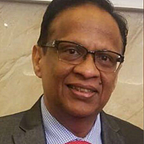A Tale of Indian Railways: Dakshin Express
During my school summer holidays in Hyderabad, in the 1960s, it was a family ritual to travel to my grandparents’ home in Dehra Dun. My father would join us for a week or two, but my mother, sister and I would spend at least a month with my mother’s parents. The weather there was not as hot as in the rest of the country, and some of my cousins and aunts who lived in or near Delhi would also join us there. We kids played all day long, while my mother caught up with all the family news and gossip with her parents and siblings.
The journey from Hyderabad to Dehra Dun, a distance of close to 2000 km, took 44 hours by train. We took the night train from Hyderabad, and after traveling two nights and a day reached Delhi 34 hours later. We spent the day in Delhi and then took the overnight Mussoorie Express to Dehra Dun. The same routine was repeated on the return journey, spending three consecutive nights on a train.
In those days, there was no direct train even from Hyderabad to Delhi. Instead, two coaches were hauled by a passenger train from Hyderabad to Warangal (Kazipet station), where they would be attached to the Southern Express, a daily train which operated between Madras (now called Chennai), and Delhi. Madras also had a grand sounding Grand Trunk Express operating on this sector, but this was exclusively for Madras passengers.
Getting a reservation on the third class sleeper coach from Hyderabad called for meticulous planning. The reservation opened 30 days before the date of journey, and on the appointed day one had to queue up at the booking counter well before the counter opened. There were 72 berths in the coach, and these would be sold out within the hour. If you failed to get the reservation, you had to queue up again the next day and also postpone travel by a day. For the return journey one had to get someone in your destination town to make the reservations for you. If anyone had to travel at short notice, one had to try for a reservation in the second coach, which was part first class (cost three times as the third class), and part unreserved third class (impossible even to enter this coach unless one was an able bodied male in the 16–40 age group, which applied to none of us). There was no second class. (In later years, the third class was renamed second class, so all these passengers got a free upgrade!)
One year there was added excitement in the family as my mother’s youngest sister was getting married during the summer break in Dehra Dun. My mother particularly was looking forward to attending this event, and new clothes were duly purchased for all. The all important train reservations had been made and everything was set for the trip.
A few days before our date of travel, my mother developed high fever. It did not subside quickly and we had to cancel the bookings as she would definitely not be able to make the long journey. My mother was understandably very disappointed, and her parents letters and telegrams insisting that she must somehow come, sent her into tears.
A week later she felt better and as the wedding was still a fortnight away, we tried to get fresh tickets booked for the journey. But as expected, this was impossible and the earliest available tickets were for 30 days later. My mother, normally very frugal, suggested to my father that we travel first class at least one way, and skip the holidays next year, to keep the family budget intact. But even these were sold out by then, and he flatly refused to buy airline tickets, which were available, but cost six times the train fare. Reluctantly we reconciled ourselves to spending the summer break at home in Hyderabad and missing my aunt’s wedding.
But unknown to us, fate was playing a devious game!
In the mid 1960s, the central government in India decided to make Hindi the sole official language of the country, instead of having both Hindi and English as official languages. This was opposed by non Hindi speaking states, particularly by Tamilnadu, whose capital was Madras. The Railways was a central government run institution, and the Minister in charge announced that the Southern Express would be renamed Dakshin Express from a certain date (Dakshin being “South” in Hindi). This was the last straw for Tamilnadu which vowed not to let this happen. The first time the train with its new name reached the Tamilnadu border, it was stopped by agitators squatting on the rail tracks, and the train could not proceed to Madras. There was now an impasse. The minister refused to revert to the old name of the train, and the agitators refused to let it operate with the new name!
Eventually a face-saving solution was found. Dakshin Express would operate henceforth as a Delhi- Hyderabad train. Some of its coaches would be detached at Warangal and hauled to Madras by a new train called Link Express. It was a brilliant win-win solution! People of Madras were happy that they had made their point. People of Hyderabad were happy that they now had a full daily train to Delhi which increased the capacity almost fivefold overnight. But the happiest person was my mother who was now able to attend her sister’s wedding.
